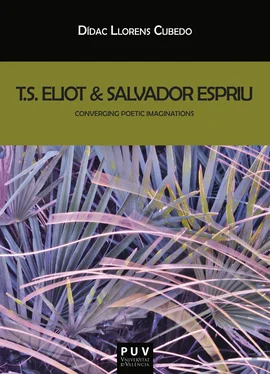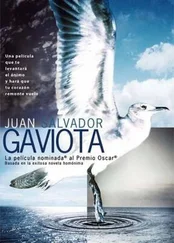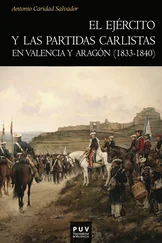T. S. ELIOT AND SALVADOR ESPRIU CONVERGING POETIC IMAGINATIONS
Biblioteca Javier Coy d’estudis nord-americans
http://www.uv.es/bibjcoy
Directora
Carme Manuel
T. S. ELIOT AND SALVADOR ESPRIU CONVERGING POETIC IMAGINATIONS
Dídac Llorens Cubedo
Biblioteca Javier Coy d’estudis nord-americans
Universitat de València
T. S. Eliot and Salvador Espriu: Converging Poetic Imaginations
© Dídac Llorens Cubedo
1ª edición de 2013
Reservados todos los derechos
Prohibida su reproducción total o parcial
ISBN: 978-84-9134-144-4
Imagen de la portada: Sophia de Vera Höltz
Diseño de la cubierta: Celso Hernández de la Figuera
Publicacions de la Universitat de València
http://puv.uv.es
publicacions@uv.es
Contents
Introduction
Chapter 1
Devastation and the Desert
Chapter 2
A Glimpse of the Garden
Chapter 3
Cities and Souls
Chapter 4
Time and Beyond
Conclusion
Works Cited and Consulted
List of Abbreviations
AW Ash Wednesday
BD ‘The Burial of the Dead’
BN ‘Burnt Norton’
CA Cançons d’Ariadna
CM El caminant i el mur
CS Cementiri de Sinera
DS ‘The Dry Salvages’
DW ‘Death by Water’
EC ‘East Coker’
FL Final del Laberint
FQ Four Quartets
FS ‘The Fire Sermon’
GC ‘A Game of Chess’
HM The Hollow Men
LG ‘Little Gidding’
LH Les Hores
LS Llibre de Sinera
MD Mrs Death
PB La pell de brau
Pruf Prufrock and Other Observations
SS Setmana Santa
WL The Waste Land
WTS ‘What the Thunder Said’
Acknowledgements
Thank you / Gràcies
Massimo Bacigalupo, John Connolly, Rosa M. Delor i Muns, Mary E. Farrell Kane, Josep M. Jaumà i Musté, Helios Jaime Ramírez, Nati Juste Vidal, Dominic Keown, Carme Manuel Cuenca, Viorica Patea Birk, David Gareth Walters.
Introduction
E com la dita història e actes del dit Tirant sien en llengua anglesa, e a vostra il⋅lustre senyoria sia estat grat voler-me pregar la giràs en llengua portuguesa, opinant, per jo ésser estat algun temps en l’illa d’Anglaterra, degués millor saber aquella llengua que altri [...] m’atreviré expondre, no solament de llengua anglesa en portuguesa, mas encara de portuguesa en vulgar valenciana, per ço que la nació d’on jo só natural se’n puixa alegrar e molt ajudar per los tants e tan insignes actes com hi són; suplicant vostra virtuosíssima senyoria accepteu com de servidor afectat la present obra—car si defalliments alguns hi són, certament, senyor, n’és en part causa la dita llengua anglesa, de la qual en algunes partides és impossible de girar los vocables.
Tirant lo Blanc , ‘Dedicatòria’
The present work is a comparative study of the poetic imagination of T. S. Eliot (1888-1965) and Salvador Espriu (1913-1985), grounded on the assumption that they are comparable poets. This is made evident in their common use of a number of archetypal images rooted in a literary tradition that they attempt to preserve and continue. Considering the public perception of Eliot and Espriu and the awareness of their respective cultures is a good starting-point.
The depth and richness of the literary productions of Espriu and Eliot, as well as their image of self-sufficient and autonomous poets, may be the reasons why comparative approaches involving either of them are scarce. In Spain, however, Eliot’s poetry has been examined contrastively, along with the works of Federico García Lorca, Pedro Salinas, Jaime Gil de Biedma or the poets of the ‘generación del 27.’ 1 On the other hand, Rosa Maria Delor i Muns’ study on Espriu and his friend Bartomeu Rosselló Pòrcel is also exceptional, although the emphasis is on the former, who, the author claims, paid homage to the deceased Majorcan poet by giving continuity to his truncated work in his own verse. 2
Even though it does not seem to have been defined and pursued as a line of research before, the essential affinity or cultural equivalence between the figures of Eliot and Espriu has been noted. In 1966, the French writer and journalist Claude Roy expressed his enthusiasm about Espriu’s poetry by comparing him to a number of key modern poets in different languages, including Eliot. According to Roy, Espriu is ‘un des plus grands poètes de l’Europe moderne, le paire d’un Breton ou d’un Aragon, d’un Dylan Thomas ou d’un Eliot, d’un Ungaretti o d’un Montale, d’un Pasternak ou d’un Vozjenenski.’ 3 Similar associations are established by Rosa Maria Pinyol in a newspaper article on the Catalan poet titled ‘Junto a Eliot, Celan o Montale.’ 4
In short academic or newspaper articles, in tangential references aimed at briefly characterising the man and his work, Espriu will be grouped with other twentieth century poets of different nationalities and Eliot is most likely to be mentioned. Certainly, the purpose is to affirm Espriu’s stature as a poet, despite his solid use and vindication of a minority language. In his acceptance speech when receiving the Premi Catalunya 2002, Harold Bloom declared Espriu a prominent figure in the Catalan canon and—adding that he should have been awarded the Nobel prize—defined him as ‘a remarkable poet by any international standard.’ 5
Sam Abrams has written about Espriu’s international projection and the translations of his work into English, concluding that ‘tots els traductors d’Espriu estan unànimement d’acord que es tracta d’un gran poeta, de talla universal, en un mot, un clàssic modern.’ Abrams points out that Bloom used a bilingual anthology of Espriu’s poetry translated and edited by Magda Bogin, where he is ranked ‘al costat de Ramon Llull, Ausiàs March, Neruda, Hernández, García Lorca, Guillén, William Carlos Williams, T. S. Eliot, Valéry, Montale, Pessoa, etc.’ 6 These groupings of international poets are interesting in that they reveal a tendency to link the two literary figures.
It will also be useful to consider the two poets’ familiarity with each other’s culture. In exploring Eliot’s Catalan reception, Albert Manent recalls how his father, Marià Manent, met Eliot in London in 1953: ‘probablement, el meu pare va anar a veure Eliot al seu despatx londinenc de “Faber and Faber.” Després el convidà a dinar a un club anglés. S’havien escrit des dels anys trenta, i en una carta del 1932 li deia que, tot i que la desconeixia, “la llengua catalana semblava tenir una beutat particular.”’ 7 One would expect that Eliot and Manent talked about the Catalan literary scene of the time, and we might conjecture that they talked about Espriu, who had already produced some of his finest books of poetry, as well as the play Primera història d’Esther , unquestionably one of the key texts of 20 thcentury Catalan literature. Be that as it may, the encounter of the Anglo-American poet with Manent is about the only direct contact that Eliot had with Catalan culture.
Like Ezra Pound, Eliot had developed an early interest in Provençal poetry, which is of course linked to the very origins of the Catalan literary tradition. Eliot was fond of the troubadours’ art and fascinated by Dante’s portrayal of the Provençal poet Arnaut Daniel. In purgatory ( Purg ., XXVI. 136-148), Arnaut pleads with Dante, as other souls have previously done in hell, to pray for him when he returns to the world of the living. Dante’s dialogue, in the context of his Purgatorio , with a poet whose work he considers a part of his own tradition, is closely related to Eliot’s characteristic technique of poetic allusion. Eliot was deeply impressed by Arnaut’s beseeching speech, which he quoted in several of his poems. For instance, in part 5 of The Waste Land , ‘What the Thunder Said,’ the line ‘Poi s’ascose nel foco che li affina’ hints at purgation as the only hope for those gone astray in a desolate world. In part IV of Ash Wednesday , the phrase ‘Sovegna vos’ is consistent with the imploring tone of the poem; interestingly, in the early drafts, the titles of each of the sections were Provençal phrases taken from Arnaut’s imploration. 8 Furthermore, Eliot titled one of his earliest poetry books Ara vos prec (1919), after Arnaut, although it was re-edited as Poems in 1920. The Provençal poet is called by Dante the ‘miglior fabbro del parlar materno’ ( Purg ., XXVI. 117) and Eliot referred to Ezra Pound, his mentor and the rigorous editor of The Waste Land manuscript, using exactly the same words in the dedication of the poem. 9
Читать дальше












